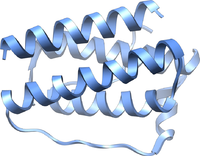
Photo from wikipedia
Leptin is an adipocyte-derived hormone, which contributes to the homeostatic regulation of energy balance and metabolism through humoral and neural pathways. Leptin acts on the neurons in certain brain areas… Click to show full abstract
Leptin is an adipocyte-derived hormone, which contributes to the homeostatic regulation of energy balance and metabolism through humoral and neural pathways. Leptin acts on the neurons in certain brain areas such as the hypothalamus, hippocampus, and brain stem to regulate food intake, thermogenesis, energy expenditure, and homeostasis of glucose/lipid metabolism. The pathologically increased circulating leptin is a biomarker of leptin resistance, which is common in obese individuals. Leptin resistance is defined by a reduced sensitivity or a failure in response of the brain to leptin, showing a decrease in the ability of leptin to suppress appetite or enhance energy expenditure, which causes an increased food intake and finally leads to overweight, obesity, cardiovascular diseases, and other metabolic disorders. Leptin resistance is a challenge for clinical treatment or drug discovery of obesity. Until recently, emerging evidence has been showing novel mechanisms of the leptin resistance. Here, we summarized the advances and controversy of leptin resistance and associated diseases, for better understanding the physiology and pathophysiology of leptin as well as the new strategies for treating obesity and metabolic disorders.
Journal Title: Advances in experimental medicine and biology
Year Published: 2018
Link to full text (if available)
Share on Social Media: Sign Up to like & get
recommendations!